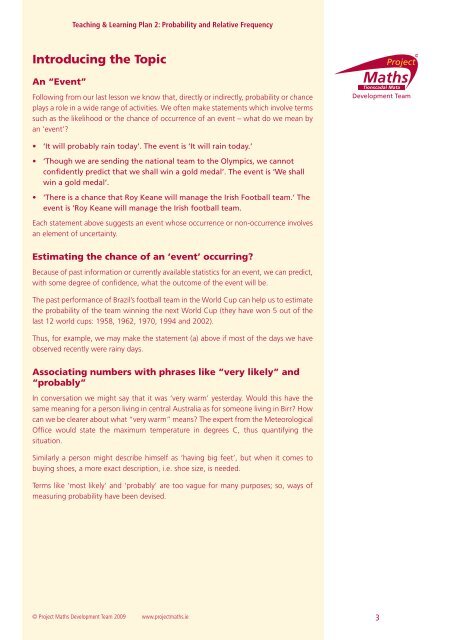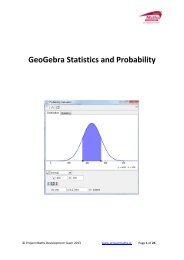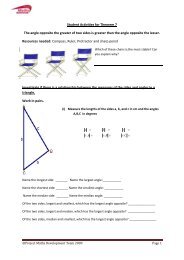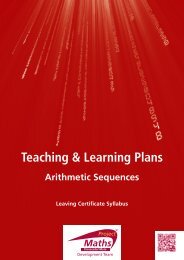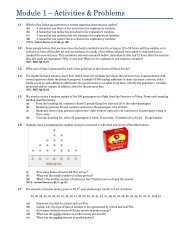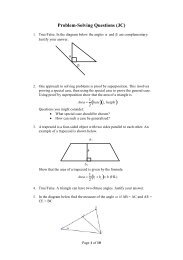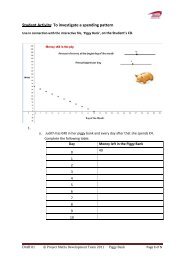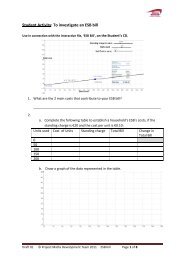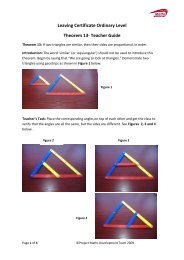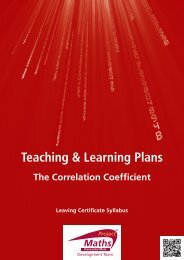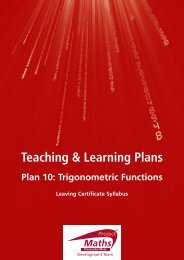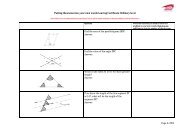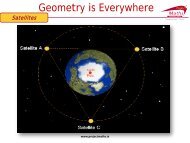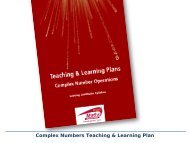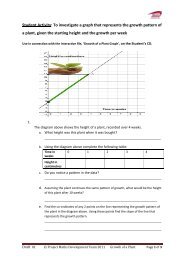Teaching & Learning Plans - Project Maths
Teaching & Learning Plans - Project Maths
Teaching & Learning Plans - Project Maths
Create successful ePaper yourself
Turn your PDF publications into a flip-book with our unique Google optimized e-Paper software.
<strong>Teaching</strong> & <strong>Learning</strong> Plan 2: Probability and Relative Frequency<br />
Introducing the Topic<br />
An “Event”<br />
Following from our last lesson we know that, directly or indirectly, probability or chance<br />
plays a role in a wide range of activities. We often make statements which involve terms<br />
such as the likelihood or the chance of occurrence of an event – what do we mean by<br />
an ‘event’?<br />
• ‘It will probably rain today’. The event is ‘It will rain today.’<br />
• ‘Though we are sending the national team to the Olympics, we cannot<br />
confidently predict that we shall win a gold medal’. The event is ‘We shall<br />
win a gold medal’.<br />
• ‘There is a chance that Roy Keane will manage the Irish Football team.’ The<br />
event is ‘Roy Keane will manage the Irish football team.<br />
Each statement above suggests an event whose occurrence or non-occurrence involves<br />
an element of uncertainty.<br />
Estimating the chance of an ‘event’ occurring?<br />
Because of past information or currently available statistics for an event, we can predict,<br />
with some degree of confidence, what the outcome of the event will be.<br />
The past performance of Brazil’s football team in the World Cup can help us to estimate<br />
the probability of the team winning the next World Cup (they have won 5 out of the<br />
last 12 world cups: 1958, 1962, 1970, 1994 and 2002).<br />
Thus, for example, we may make the statement (a) above if most of the days we have<br />
observed recently were rainy days.<br />
Associating numbers with phrases like “very likely” and<br />
“probably”<br />
In conversation we might say that it was ‘very warm’ yesterday. Would this have the<br />
same meaning for a person living in central Australia as for someone living in Birr? How<br />
can we be clearer about what “very warm” means? The expert from the Meteorological<br />
Office would state the maximum temperature in degrees C, thus quantifying the<br />
situation.<br />
Similarly a person might describe himself as ‘having big feet’, but when it comes to<br />
buying shoes, a more exact description, i.e. shoe size, is needed.<br />
Terms like ‘most likely’ and ‘probably’ are too vague for many purposes; so, ways of<br />
measuring probability have been devised.<br />
© <strong>Project</strong> <strong>Maths</strong> Development Team 2009 www.projectmaths.ie 3


